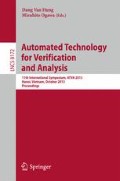Abstract
We consider the problem of computing the value and finding the epsilon-optimal strategies for concurrent Basic Process Algebra games, which is a subclass of two-player infinite-state stochastic games with imperfect information. These games are played on the transition graph of stateless pushdown systems, or equivalently 1-exit recursive state machines, and can model recursive procedural program execution with probabilistic transitions. The objective of one player in these games is to minimise the expected termination time of such a program, while the objective of the other is to maximise it. We show that the quantitative decision questions regarding the value of the game as well as checking whether this value is infinite can be answered in PSPACE. We also show the latter problem to be as hard as the square root sum, whose containment even in the polynomial hierarchy is an open problem since the 1970s. Furthermore, an optimal strategy may require an infinite amount of memory in general, but we show that both player have epsilon-optimal stackless&memoryless strategies (i.e. strategies that do not use memory nor depend on the stack content). Finally, we show how to find such strategies using a strategy improvement algorithm.
Access this chapter
Tax calculation will be finalised at checkout
Purchases are for personal use only
Preview
Unable to display preview. Download preview PDF.
References
Allender, E., Bürgisser, P., Kjeldgaard-Pedersen, J., Miltersen, P.B.: On the complexity of numerical analysis. SIAM Journal on Computing 38(5), 1987–2006 (2009)
Brázdil, T., Brožek, V., Kučera, A., Obdrzálek, J.: Qualitative reachability in stochastic BPA games. Information and Computation 209(8), 1160–1183 (2011)
Brázdil, T., Kučera, A., Novotný, P., Wojtczak, D.: Minimizing expected termination time in one-counter Markov decision processes. In: Czumaj, A., Mehlhorn, K., Pitts, A., Wattenhofer, R. (eds.) ICALP 2012, Part II. LNCS, vol. 7392, pp. 141–152. Springer, Heidelberg (2012)
Condon, A.: The complexity of stochastic games. Inf. & Comp. 96(2), 203–224 (1992)
de Alfaro, L., Henzinger, T.A.: Concurrent omega-regular games. In: Proc. of the 15th IEEE Symposium on Logic in Computer Science, pp. 141–154. IEEE Computer Society Press (2000)
de Alfaro, L., Henzinger, T.A., Kupferman, O.: Concurrent reachability games. In: Proc. of FOCS 1998, pp. 564–575 (1998)
de Alfaro, L., Majumdar, R.: Quantitative solution of omega-regular games. J. Comput. Syst. Sci. 68(2), 374–397 (2004)
Esparza, J., Kučera, A., Mayr, R.: Model checking probabilistic pushdown automata. In: Proc. of 19th IEEE LICS 2004 (2004)
Etessami, K., Wojtczak, D., Yannakakis, M.: Recursive stochastic games with positive rewards. In: Aceto, L., Damgård, I., Goldberg, L.A., Halldórsson, M.M., Ingólfsdóttir, A., Walukiewicz, I. (eds.) ICALP 2008, Part I. LNCS, vol. 5125, pp. 711–723. Springer, Heidelberg (2008)
Etessami, K., Yannakakis, M.: Algorithmic verification of recursive probabilistic state machines. In: Halbwachs, N., Zuck, L.D. (eds.) TACAS 2005. LNCS, vol. 3440, pp. 253–270. Springer, Heidelberg (2005)
Etessami, K., Yannakakis, M.: Recursive Markov chains, stochastic grammars, and monotone systems of non-linear equations. In: Diekert, V., Durand, B. (eds.) STACS 2005. LNCS, vol. 3404, pp. 340–352. Springer, Heidelberg (2005)
Etessami, K., Yannakakis, M.: Recursive Markov decision processes and recursive stochastic games. In: Caires, L., Italiano, G.F., Monteiro, L., Palamidessi, C., Yung, M. (eds.) ICALP 2005. LNCS, vol. 3580, pp. 891–903. Springer, Heidelberg (2005)
Etessami, K., Yannakakis, M.: Efficient qualitative analysis of classes of recursive Markov decision processes and simple stochastic games. In: Durand, B., Thomas, W. (eds.) STACS 2006. LNCS, vol. 3884, pp. 634–645. Springer, Heidelberg (2006)
Etessami, K., Yannakakis, M.: Recursive concurrent stochastic games. Logical Methods in Computer Science 4(4) (2008)
Etessami, K., Yannakakis, M.: On the complexity of Nash equilibria and other fixed points. SIAM Journal on Computing 39(6), 2531–2597 (2010)
Filar, J., Vrieze, K.: Competitive Markov Decision Processes. Springer (1997)
Garey, M.R., Graham, R.L., Johnson, D.S.: Some NP-complete geometric problems. In: Proc. of the 8th ACM Symposium on Theory of Computing, STOC 1976, pp. 10–22 (1976)
Hansen, K.A., Ibsen-Jensen, R., Miltersen, P.B.: The complexity of solving reachability games using value and strategy iteration. In: Kulikov, A., Vereshchagin, N. (eds.) CSR 2011. LNCS, vol. 6651, pp. 77–90. Springer, Heidelberg (2011)
Hoffman, A.J., Karp, R.M.: On nonterminating stochastic games. Management Sci. 12, 359–370 (1966)
Manning, C.D., Schütze, H.: Foundations of statistical natural language processing. MIT Press (1999)
Martin, D.A.: The Determinacy of Blackwell Games. J. Symb. Logic 63(4), 1565–1581 (1998)
Nerode, A., Yakhnis, A., Yakhnis, V.: Concurrent programs as strategies in games. In: Logic from Computer Science. Mathematical Sciences Research Institute Publications, vol. 21, pp. 405–479. Springer, New York (1992)
Osborne, M.J., Rubinstein, A.: Course in game theory. MIT Press (1994)
Pliska, S.R.: Optimization of multitype branching processes. Management Science 23(2), 117–124 (1976)
Pnueli, A., Rosner, R.: On the synthesis of a reactive module. In: Proc. of the 16th Symposium on Principles of Programming Languages, pp. 179–190. ACM (1989)
Rothblum, U.G., Whittle, P.: Growth optimality for branching Markov decision chains. Mathematics of Operations Research 7(4), 582–601 (1982)
Shapley, L.S.: Stochastic games. Proc. Nat. Acad. Sci. 39, 1095–1100 (1953)
Wojtczak, D.: Expected termination time in BPA games. Technical Report ULCS-13-005, University of Liverpool (2013), http://www.csc.liv.ac.uk/research/techreports
Author information
Authors and Affiliations
Editor information
Editors and Affiliations
Rights and permissions
Copyright information
© 2013 Springer International Publishing Switzerland
About this paper
Cite this paper
Wojtczak, D. (2013). Expected Termination Time in BPA Games. In: Van Hung, D., Ogawa, M. (eds) Automated Technology for Verification and Analysis. Lecture Notes in Computer Science, vol 8172. Springer, Cham. https://doi.org/10.1007/978-3-319-02444-8_22
Download citation
DOI: https://doi.org/10.1007/978-3-319-02444-8_22
Publisher Name: Springer, Cham
Print ISBN: 978-3-319-02443-1
Online ISBN: 978-3-319-02444-8
eBook Packages: Computer ScienceComputer Science (R0)

